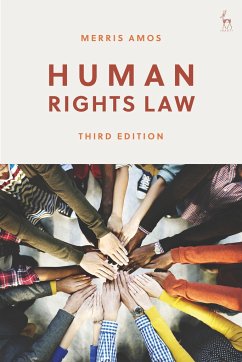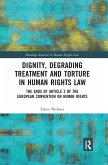Merris Amos (University of London Queen Mary)
Human Rights Law
Merris Amos (University of London Queen Mary)
Human Rights Law
- Broschiertes Buch
- Merkliste
- Auf die Merkliste
- Bewerten Bewerten
- Teilen
- Produkt teilen
- Produkterinnerung
- Produkterinnerung
This textbook comprehensively examines and analyses the interpretation and application of the United Kingdom's Human Rights Act 1998. The third edition has been fully updated to include the last seven years of case law. Part I covers key procedural issues including: the background to the Act; the relationship between UK courts and the European Court of Human Rights; the definition of victim and public authority; determining incompatibility including deference and proportionality; the impact of the Act on primary legislation; and damages and other remedies for the violation of Convention…mehr
Andere Kunden interessierten sich auch für
![The EU Charter of Fundamental Rights The EU Charter of Fundamental Rights]() The EU Charter of Fundamental Rights434,99 €
The EU Charter of Fundamental Rights434,99 €![Jacobs, White, and Ovey: The European Convention on Human Rights Jacobs, White, and Ovey: The European Convention on Human Rights]() Bernadette Rainey (Cardiff School of Law an Senior Lecturer in LawJacobs, White, and Ovey: The European Convention on Human Rights47,99 €
Bernadette Rainey (Cardiff School of Law an Senior Lecturer in LawJacobs, White, and Ovey: The European Convention on Human Rights47,99 €![Concentrate Questions and Answers Human Rights and Civil Liberties Concentrate Questions and Answers Human Rights and Civil Liberties]() Dr Steve Foster (Principal Lecturer in L Principal Lecturer in LawConcentrate Questions and Answers Human Rights and Civil Liberties17,99 €
Dr Steve Foster (Principal Lecturer in L Principal Lecturer in LawConcentrate Questions and Answers Human Rights and Civil Liberties17,99 €![International Human Rights Law International Human Rights Law]() Mark GibneyInternational Human Rights Law44,99 €
Mark GibneyInternational Human Rights Law44,99 €![Dignity, Degrading Treatment and Torture in Human Rights Law Dignity, Degrading Treatment and Torture in Human Rights Law]() Elaine Webster (UK University of Strathclyde)Dignity, Degrading Treatment and Torture in Human Rights Law60,99 €
Elaine Webster (UK University of Strathclyde)Dignity, Degrading Treatment and Torture in Human Rights Law60,99 €![The Incoherence of Human Rights in International Law The Incoherence of Human Rights in International Law]() The Incoherence of Human Rights in International Law142,99 €
The Incoherence of Human Rights in International Law142,99 €![International Human Rights Law International Human Rights Law]() Mark GibneyInternational Human Rights Law119,99 €
Mark GibneyInternational Human Rights Law119,99 €-
-
-
This textbook comprehensively examines and analyses the interpretation and application of the United Kingdom's Human Rights Act 1998. The third edition has been fully updated to include the last seven years of case law. Part I covers key procedural issues including: the background to the Act; the relationship between UK courts and the European Court of Human Rights; the definition of victim and public authority; determining incompatibility including deference and proportionality; the impact of the Act on primary legislation; and damages and other remedies for the violation of Convention rights. In Part II of the book, the Convention rights, as interpreted and applied by United Kingdom courts, are examined in detail. All of the key Convention rights are discussed including: the right to life; freedom from torture and inhuman or degrading treatment or punishment; the right to liberty; fair trial; the rights to private life, family life and home; freedom of religion and belief; freedom of expression; the right to peaceful enjoyment of possessions; and the right to freedom from discrimination in the enjoyment of Convention rights. The third edition of Human Rights Law will be invaluable for those teaching, studying and practising in the areas of United Kingdom human rights law, constitutional law and administrative law.
Hinweis: Dieser Artikel kann nur an eine deutsche Lieferadresse ausgeliefert werden.
Hinweis: Dieser Artikel kann nur an eine deutsche Lieferadresse ausgeliefert werden.
Produktdetails
- Produktdetails
- Verlag: Bloomsbury Publishing PLC
- 3 ed
- Seitenzahl: 880
- Erscheinungstermin: 15. Juli 2021
- Englisch
- Abmessung: 173mm x 244mm x 47mm
- Gewicht: 1478g
- ISBN-13: 9781509933297
- ISBN-10: 1509933298
- Artikelnr.: 60606704
- Herstellerkennzeichnung
- Libri GmbH
- Europaallee 1
- 36244 Bad Hersfeld
- 06621 890
- Verlag: Bloomsbury Publishing PLC
- 3 ed
- Seitenzahl: 880
- Erscheinungstermin: 15. Juli 2021
- Englisch
- Abmessung: 173mm x 244mm x 47mm
- Gewicht: 1478g
- ISBN-13: 9781509933297
- ISBN-10: 1509933298
- Artikelnr.: 60606704
- Herstellerkennzeichnung
- Libri GmbH
- Europaallee 1
- 36244 Bad Hersfeld
- 06621 890
Merris Amos is Profesor of Human Rights Law at Queen Mary, University of London. She has many years of experience in researching and teaching human rights law and has published widely in the area. Her particular area of expertise is the United Kingdom's Human Rights Act.
PART I
THE HUMAN RIGHTS ACT
1. Background and Interpretation
1. The Protection of Human Rights Prior to the Human Rights Act
2. Background to the Human Rights Act
3. Purpose of the Human Rights Act
4. Structure of the Human Rights Act
5. Convention Rights given Further Effect
6. Principles of Interpretation
7. UK Courts and the European Court of Human Rights
8. Other Aids to Interpretation
9. The Protection of Human Rights via the Common Law and EU Law
10. Reform of the Human Rights Act
2. The Benefit and Burden of the Human Rights Act
1. Introduction
2. The Benefit of Convention Rights: Victims
3. The Burden of Convention Rights: Public Authorities
4. Core Public Authorities
5. Hybrid Public Authorities
6. Private Bodies
3. The 'Acts' to which the Human Rights Act Applies
1. Introduction
2. Limitation Period
3. Retrospective Effect
4. Acts which Occur Outside of the United Kingdom: Extra-territorial Effect
5. Failure to Act: Positive Duties
6. Satellite Litigation
4. Determining Incompatibility
1. Introduction
2. Prescribed by Law
3. Necessary
4. Proportionality
5. Deference
6. Deference in Practice
5. The Defence of Primary Legislation
1. Introduction
2. Section 6(2) Human Rights Act
3. Section 3 Human Rights Act
4. Section 4 Human Rights Act
5. Subordinate (Secondary) Legislation
6. The Use of Hansard and Other Materials in Compatibility Cases
7. Section 19 Human Rights Act: Statements of Compatibility
6. Remedies
1. Introduction
2. Just and Appropriate
3. Effective
4. The Power to Award Damages
5. Court Must have the Power to Award Damages
6. Just Satisfaction
7. The Principles Applied by the European Court of Human Rights
8. The Level of Damages
9. Damages: Article 2
10. Damages: Article 3
11. Damages: Article 5
12. Damages: Article 6
13. Damages: Article 8
14. Damages: Article 14
PART II
THE CONVENTION RIGHTS
7. Article 2: The Right to Life
1. Introduction
2. Scope
3. Definition of 'Life'
4. Intentional Deprivation of Life
5. The Positive Duty to Safeguard Life - Operational Duty
6. Positive Duty to Safeguard Life - Framework Duty
7. Duty to Investigate Deaths
8. Exceptions - Article 2(2)
8. Article 3: Prohibition of Torture and Inhuman or Degrading Treatment or
Punishment
1. Introduction
2. Inhuman or Degrading Treatment - Severity
3. The Positive Duty to Protect from Article 3 Ill-Treatment - Operational
Duty
4. Positive Duty to Protect from Article 3 Ill-Treatment - Framework Duty
5. Duty to Investigate Article 3 Ill-Treatment
6. Physical Integrity
7. Conditions of Detention and Treatment of Detainees
8. Violence and Threatening Behaviour
9. Sentencing
10. State Support
11. Removal, Deportation and Extradition
9. Article 5: The Right to Liberty and Security
1. Introduction
2. What Constitutes a Deprivation of Liberty?
3. Article 5(1)
4. Article 5(2): Reasons for Arrest
5. Article 5(3)
6. Article 5(4)
7. Article 5(5): Enforceable Right to Compensation
10. Article 6: The Right to a Fair Trial
1. Introduction
2. Removal, Deportation and Extradition
3. Article 6(1) Application: Determination of Civil Rights and Obligations
4. Article 6(1) Application: Determination of Any Criminal Charge
5. Access to Court
6. Fair Hearing
7. Public Hearing and Public Pronouncement
8. Reasonable Time
9. Independent and Impartial Tribunal
10. Tribunal Established by Law
11. Article 6(2): Presumption of Innocence
12. Article 6(3)(a): Informed of the Nature and Cause of the Accusation
13. Article 6(3)(b): Adequate Time and Facilities for Preparation of
Defence
14. Article 6(3)(c): Legal Assistance
15. Article 6(3)(d): Witnesses
16. Article 6(3)(e): Interpreter
11. Article 8: The Right to Respect for Private Life
1. Introduction
2. Who Must Respect Private Life? The Development of Tort Law
3. Private Life
4. Positive Duties
5. Permitted Interferences
6. National Security
7. Economic Well-being of the Country
8. Prevention of Disorder or Crime
9. Protection of Health
10. Protection of Morals
11. Protection of the Rights and Freedoms of Others
12. Article 8: The Right to Respect for Family Life
1. Introduction
2. Family Life
3. Interference
4. Permitted Interferences
5. Economic Well-being of the Country
6. Prevention of Disorder or Crime
7. Protection of the Rights and Freedoms of Others
13. Article 8: The Right to Respect for Home
1. Introduction
2. Home
3. Interference
4. Positive Duties
5. Justifying an Interference with the Right to Respect for Home
6. For the Prevention of Disorder or Crime
7. Economic Well-being of the Country
8. Protection of the Rights and Freedoms of Others
14. Article 9: Freedom of Thought, Conscience and Religion
1. Introduction
2. The Right to Believe
3. The Right to Manifest
4. Interference with Manifestation of Belief
5. Permitted Interferences with the Right to Manifest
15. Article 10: The Right to Freedom of Expression
1. Introduction
2. Expression
3. Medium, Manner and Timing of Communication
4. Freedom to Receive and Impart Information and Ideas
5. Interference
6. Positive Duties
7. Permitted Interferences - Generally
8. Proportionality - General Principles
9. National Security
10. Prevention of Disorder or Crime
11. Protection of Health or Morals
12. Protection of the Reputation of Others
13. Protection of the Rights of Others
14. Preventing the Disclosure of Information Received in Confidence
15. Maintaining the Authority and Impartiality of the Judiciary
16. Article 14: Prohibition of Discrimination
1. Introduction
2. Application: No Independent Existence
3. Without Discrimination
4. Grounds of Prohibited Discrimination
5. Analogous Position - Comparators
6. Objective and Reasonable Justification
7. Remedy for Breach
8. Positive Duties
17. Article 1 of Protocol No 1: Protection of Property
1. Introduction
2. Possessions
3. Interferences with the Peaceful Enjoyment of Possessions
4. Justifying Interferences
5. Consumer Protection
6. Planning and the Environment
7. The Rights of Others - Article 1 of Protocol 1
8. Social Justice
9. Protection of Morals
10. Prevention of Crime and Illegality
11. Economic Well-being of the Country
12. Reduction of the National Budget Deficit
THE HUMAN RIGHTS ACT
1. Background and Interpretation
1. The Protection of Human Rights Prior to the Human Rights Act
2. Background to the Human Rights Act
3. Purpose of the Human Rights Act
4. Structure of the Human Rights Act
5. Convention Rights given Further Effect
6. Principles of Interpretation
7. UK Courts and the European Court of Human Rights
8. Other Aids to Interpretation
9. The Protection of Human Rights via the Common Law and EU Law
10. Reform of the Human Rights Act
2. The Benefit and Burden of the Human Rights Act
1. Introduction
2. The Benefit of Convention Rights: Victims
3. The Burden of Convention Rights: Public Authorities
4. Core Public Authorities
5. Hybrid Public Authorities
6. Private Bodies
3. The 'Acts' to which the Human Rights Act Applies
1. Introduction
2. Limitation Period
3. Retrospective Effect
4. Acts which Occur Outside of the United Kingdom: Extra-territorial Effect
5. Failure to Act: Positive Duties
6. Satellite Litigation
4. Determining Incompatibility
1. Introduction
2. Prescribed by Law
3. Necessary
4. Proportionality
5. Deference
6. Deference in Practice
5. The Defence of Primary Legislation
1. Introduction
2. Section 6(2) Human Rights Act
3. Section 3 Human Rights Act
4. Section 4 Human Rights Act
5. Subordinate (Secondary) Legislation
6. The Use of Hansard and Other Materials in Compatibility Cases
7. Section 19 Human Rights Act: Statements of Compatibility
6. Remedies
1. Introduction
2. Just and Appropriate
3. Effective
4. The Power to Award Damages
5. Court Must have the Power to Award Damages
6. Just Satisfaction
7. The Principles Applied by the European Court of Human Rights
8. The Level of Damages
9. Damages: Article 2
10. Damages: Article 3
11. Damages: Article 5
12. Damages: Article 6
13. Damages: Article 8
14. Damages: Article 14
PART II
THE CONVENTION RIGHTS
7. Article 2: The Right to Life
1. Introduction
2. Scope
3. Definition of 'Life'
4. Intentional Deprivation of Life
5. The Positive Duty to Safeguard Life - Operational Duty
6. Positive Duty to Safeguard Life - Framework Duty
7. Duty to Investigate Deaths
8. Exceptions - Article 2(2)
8. Article 3: Prohibition of Torture and Inhuman or Degrading Treatment or
Punishment
1. Introduction
2. Inhuman or Degrading Treatment - Severity
3. The Positive Duty to Protect from Article 3 Ill-Treatment - Operational
Duty
4. Positive Duty to Protect from Article 3 Ill-Treatment - Framework Duty
5. Duty to Investigate Article 3 Ill-Treatment
6. Physical Integrity
7. Conditions of Detention and Treatment of Detainees
8. Violence and Threatening Behaviour
9. Sentencing
10. State Support
11. Removal, Deportation and Extradition
9. Article 5: The Right to Liberty and Security
1. Introduction
2. What Constitutes a Deprivation of Liberty?
3. Article 5(1)
4. Article 5(2): Reasons for Arrest
5. Article 5(3)
6. Article 5(4)
7. Article 5(5): Enforceable Right to Compensation
10. Article 6: The Right to a Fair Trial
1. Introduction
2. Removal, Deportation and Extradition
3. Article 6(1) Application: Determination of Civil Rights and Obligations
4. Article 6(1) Application: Determination of Any Criminal Charge
5. Access to Court
6. Fair Hearing
7. Public Hearing and Public Pronouncement
8. Reasonable Time
9. Independent and Impartial Tribunal
10. Tribunal Established by Law
11. Article 6(2): Presumption of Innocence
12. Article 6(3)(a): Informed of the Nature and Cause of the Accusation
13. Article 6(3)(b): Adequate Time and Facilities for Preparation of
Defence
14. Article 6(3)(c): Legal Assistance
15. Article 6(3)(d): Witnesses
16. Article 6(3)(e): Interpreter
11. Article 8: The Right to Respect for Private Life
1. Introduction
2. Who Must Respect Private Life? The Development of Tort Law
3. Private Life
4. Positive Duties
5. Permitted Interferences
6. National Security
7. Economic Well-being of the Country
8. Prevention of Disorder or Crime
9. Protection of Health
10. Protection of Morals
11. Protection of the Rights and Freedoms of Others
12. Article 8: The Right to Respect for Family Life
1. Introduction
2. Family Life
3. Interference
4. Permitted Interferences
5. Economic Well-being of the Country
6. Prevention of Disorder or Crime
7. Protection of the Rights and Freedoms of Others
13. Article 8: The Right to Respect for Home
1. Introduction
2. Home
3. Interference
4. Positive Duties
5. Justifying an Interference with the Right to Respect for Home
6. For the Prevention of Disorder or Crime
7. Economic Well-being of the Country
8. Protection of the Rights and Freedoms of Others
14. Article 9: Freedom of Thought, Conscience and Religion
1. Introduction
2. The Right to Believe
3. The Right to Manifest
4. Interference with Manifestation of Belief
5. Permitted Interferences with the Right to Manifest
15. Article 10: The Right to Freedom of Expression
1. Introduction
2. Expression
3. Medium, Manner and Timing of Communication
4. Freedom to Receive and Impart Information and Ideas
5. Interference
6. Positive Duties
7. Permitted Interferences - Generally
8. Proportionality - General Principles
9. National Security
10. Prevention of Disorder or Crime
11. Protection of Health or Morals
12. Protection of the Reputation of Others
13. Protection of the Rights of Others
14. Preventing the Disclosure of Information Received in Confidence
15. Maintaining the Authority and Impartiality of the Judiciary
16. Article 14: Prohibition of Discrimination
1. Introduction
2. Application: No Independent Existence
3. Without Discrimination
4. Grounds of Prohibited Discrimination
5. Analogous Position - Comparators
6. Objective and Reasonable Justification
7. Remedy for Breach
8. Positive Duties
17. Article 1 of Protocol No 1: Protection of Property
1. Introduction
2. Possessions
3. Interferences with the Peaceful Enjoyment of Possessions
4. Justifying Interferences
5. Consumer Protection
6. Planning and the Environment
7. The Rights of Others - Article 1 of Protocol 1
8. Social Justice
9. Protection of Morals
10. Prevention of Crime and Illegality
11. Economic Well-being of the Country
12. Reduction of the National Budget Deficit
PART I
THE HUMAN RIGHTS ACT
1. Background and Interpretation
1. The Protection of Human Rights Prior to the Human Rights Act
2. Background to the Human Rights Act
3. Purpose of the Human Rights Act
4. Structure of the Human Rights Act
5. Convention Rights given Further Effect
6. Principles of Interpretation
7. UK Courts and the European Court of Human Rights
8. Other Aids to Interpretation
9. The Protection of Human Rights via the Common Law and EU Law
10. Reform of the Human Rights Act
2. The Benefit and Burden of the Human Rights Act
1. Introduction
2. The Benefit of Convention Rights: Victims
3. The Burden of Convention Rights: Public Authorities
4. Core Public Authorities
5. Hybrid Public Authorities
6. Private Bodies
3. The 'Acts' to which the Human Rights Act Applies
1. Introduction
2. Limitation Period
3. Retrospective Effect
4. Acts which Occur Outside of the United Kingdom: Extra-territorial Effect
5. Failure to Act: Positive Duties
6. Satellite Litigation
4. Determining Incompatibility
1. Introduction
2. Prescribed by Law
3. Necessary
4. Proportionality
5. Deference
6. Deference in Practice
5. The Defence of Primary Legislation
1. Introduction
2. Section 6(2) Human Rights Act
3. Section 3 Human Rights Act
4. Section 4 Human Rights Act
5. Subordinate (Secondary) Legislation
6. The Use of Hansard and Other Materials in Compatibility Cases
7. Section 19 Human Rights Act: Statements of Compatibility
6. Remedies
1. Introduction
2. Just and Appropriate
3. Effective
4. The Power to Award Damages
5. Court Must have the Power to Award Damages
6. Just Satisfaction
7. The Principles Applied by the European Court of Human Rights
8. The Level of Damages
9. Damages: Article 2
10. Damages: Article 3
11. Damages: Article 5
12. Damages: Article 6
13. Damages: Article 8
14. Damages: Article 14
PART II
THE CONVENTION RIGHTS
7. Article 2: The Right to Life
1. Introduction
2. Scope
3. Definition of 'Life'
4. Intentional Deprivation of Life
5. The Positive Duty to Safeguard Life - Operational Duty
6. Positive Duty to Safeguard Life - Framework Duty
7. Duty to Investigate Deaths
8. Exceptions - Article 2(2)
8. Article 3: Prohibition of Torture and Inhuman or Degrading Treatment or
Punishment
1. Introduction
2. Inhuman or Degrading Treatment - Severity
3. The Positive Duty to Protect from Article 3 Ill-Treatment - Operational
Duty
4. Positive Duty to Protect from Article 3 Ill-Treatment - Framework Duty
5. Duty to Investigate Article 3 Ill-Treatment
6. Physical Integrity
7. Conditions of Detention and Treatment of Detainees
8. Violence and Threatening Behaviour
9. Sentencing
10. State Support
11. Removal, Deportation and Extradition
9. Article 5: The Right to Liberty and Security
1. Introduction
2. What Constitutes a Deprivation of Liberty?
3. Article 5(1)
4. Article 5(2): Reasons for Arrest
5. Article 5(3)
6. Article 5(4)
7. Article 5(5): Enforceable Right to Compensation
10. Article 6: The Right to a Fair Trial
1. Introduction
2. Removal, Deportation and Extradition
3. Article 6(1) Application: Determination of Civil Rights and Obligations
4. Article 6(1) Application: Determination of Any Criminal Charge
5. Access to Court
6. Fair Hearing
7. Public Hearing and Public Pronouncement
8. Reasonable Time
9. Independent and Impartial Tribunal
10. Tribunal Established by Law
11. Article 6(2): Presumption of Innocence
12. Article 6(3)(a): Informed of the Nature and Cause of the Accusation
13. Article 6(3)(b): Adequate Time and Facilities for Preparation of
Defence
14. Article 6(3)(c): Legal Assistance
15. Article 6(3)(d): Witnesses
16. Article 6(3)(e): Interpreter
11. Article 8: The Right to Respect for Private Life
1. Introduction
2. Who Must Respect Private Life? The Development of Tort Law
3. Private Life
4. Positive Duties
5. Permitted Interferences
6. National Security
7. Economic Well-being of the Country
8. Prevention of Disorder or Crime
9. Protection of Health
10. Protection of Morals
11. Protection of the Rights and Freedoms of Others
12. Article 8: The Right to Respect for Family Life
1. Introduction
2. Family Life
3. Interference
4. Permitted Interferences
5. Economic Well-being of the Country
6. Prevention of Disorder or Crime
7. Protection of the Rights and Freedoms of Others
13. Article 8: The Right to Respect for Home
1. Introduction
2. Home
3. Interference
4. Positive Duties
5. Justifying an Interference with the Right to Respect for Home
6. For the Prevention of Disorder or Crime
7. Economic Well-being of the Country
8. Protection of the Rights and Freedoms of Others
14. Article 9: Freedom of Thought, Conscience and Religion
1. Introduction
2. The Right to Believe
3. The Right to Manifest
4. Interference with Manifestation of Belief
5. Permitted Interferences with the Right to Manifest
15. Article 10: The Right to Freedom of Expression
1. Introduction
2. Expression
3. Medium, Manner and Timing of Communication
4. Freedom to Receive and Impart Information and Ideas
5. Interference
6. Positive Duties
7. Permitted Interferences - Generally
8. Proportionality - General Principles
9. National Security
10. Prevention of Disorder or Crime
11. Protection of Health or Morals
12. Protection of the Reputation of Others
13. Protection of the Rights of Others
14. Preventing the Disclosure of Information Received in Confidence
15. Maintaining the Authority and Impartiality of the Judiciary
16. Article 14: Prohibition of Discrimination
1. Introduction
2. Application: No Independent Existence
3. Without Discrimination
4. Grounds of Prohibited Discrimination
5. Analogous Position - Comparators
6. Objective and Reasonable Justification
7. Remedy for Breach
8. Positive Duties
17. Article 1 of Protocol No 1: Protection of Property
1. Introduction
2. Possessions
3. Interferences with the Peaceful Enjoyment of Possessions
4. Justifying Interferences
5. Consumer Protection
6. Planning and the Environment
7. The Rights of Others - Article 1 of Protocol 1
8. Social Justice
9. Protection of Morals
10. Prevention of Crime and Illegality
11. Economic Well-being of the Country
12. Reduction of the National Budget Deficit
THE HUMAN RIGHTS ACT
1. Background and Interpretation
1. The Protection of Human Rights Prior to the Human Rights Act
2. Background to the Human Rights Act
3. Purpose of the Human Rights Act
4. Structure of the Human Rights Act
5. Convention Rights given Further Effect
6. Principles of Interpretation
7. UK Courts and the European Court of Human Rights
8. Other Aids to Interpretation
9. The Protection of Human Rights via the Common Law and EU Law
10. Reform of the Human Rights Act
2. The Benefit and Burden of the Human Rights Act
1. Introduction
2. The Benefit of Convention Rights: Victims
3. The Burden of Convention Rights: Public Authorities
4. Core Public Authorities
5. Hybrid Public Authorities
6. Private Bodies
3. The 'Acts' to which the Human Rights Act Applies
1. Introduction
2. Limitation Period
3. Retrospective Effect
4. Acts which Occur Outside of the United Kingdom: Extra-territorial Effect
5. Failure to Act: Positive Duties
6. Satellite Litigation
4. Determining Incompatibility
1. Introduction
2. Prescribed by Law
3. Necessary
4. Proportionality
5. Deference
6. Deference in Practice
5. The Defence of Primary Legislation
1. Introduction
2. Section 6(2) Human Rights Act
3. Section 3 Human Rights Act
4. Section 4 Human Rights Act
5. Subordinate (Secondary) Legislation
6. The Use of Hansard and Other Materials in Compatibility Cases
7. Section 19 Human Rights Act: Statements of Compatibility
6. Remedies
1. Introduction
2. Just and Appropriate
3. Effective
4. The Power to Award Damages
5. Court Must have the Power to Award Damages
6. Just Satisfaction
7. The Principles Applied by the European Court of Human Rights
8. The Level of Damages
9. Damages: Article 2
10. Damages: Article 3
11. Damages: Article 5
12. Damages: Article 6
13. Damages: Article 8
14. Damages: Article 14
PART II
THE CONVENTION RIGHTS
7. Article 2: The Right to Life
1. Introduction
2. Scope
3. Definition of 'Life'
4. Intentional Deprivation of Life
5. The Positive Duty to Safeguard Life - Operational Duty
6. Positive Duty to Safeguard Life - Framework Duty
7. Duty to Investigate Deaths
8. Exceptions - Article 2(2)
8. Article 3: Prohibition of Torture and Inhuman or Degrading Treatment or
Punishment
1. Introduction
2. Inhuman or Degrading Treatment - Severity
3. The Positive Duty to Protect from Article 3 Ill-Treatment - Operational
Duty
4. Positive Duty to Protect from Article 3 Ill-Treatment - Framework Duty
5. Duty to Investigate Article 3 Ill-Treatment
6. Physical Integrity
7. Conditions of Detention and Treatment of Detainees
8. Violence and Threatening Behaviour
9. Sentencing
10. State Support
11. Removal, Deportation and Extradition
9. Article 5: The Right to Liberty and Security
1. Introduction
2. What Constitutes a Deprivation of Liberty?
3. Article 5(1)
4. Article 5(2): Reasons for Arrest
5. Article 5(3)
6. Article 5(4)
7. Article 5(5): Enforceable Right to Compensation
10. Article 6: The Right to a Fair Trial
1. Introduction
2. Removal, Deportation and Extradition
3. Article 6(1) Application: Determination of Civil Rights and Obligations
4. Article 6(1) Application: Determination of Any Criminal Charge
5. Access to Court
6. Fair Hearing
7. Public Hearing and Public Pronouncement
8. Reasonable Time
9. Independent and Impartial Tribunal
10. Tribunal Established by Law
11. Article 6(2): Presumption of Innocence
12. Article 6(3)(a): Informed of the Nature and Cause of the Accusation
13. Article 6(3)(b): Adequate Time and Facilities for Preparation of
Defence
14. Article 6(3)(c): Legal Assistance
15. Article 6(3)(d): Witnesses
16. Article 6(3)(e): Interpreter
11. Article 8: The Right to Respect for Private Life
1. Introduction
2. Who Must Respect Private Life? The Development of Tort Law
3. Private Life
4. Positive Duties
5. Permitted Interferences
6. National Security
7. Economic Well-being of the Country
8. Prevention of Disorder or Crime
9. Protection of Health
10. Protection of Morals
11. Protection of the Rights and Freedoms of Others
12. Article 8: The Right to Respect for Family Life
1. Introduction
2. Family Life
3. Interference
4. Permitted Interferences
5. Economic Well-being of the Country
6. Prevention of Disorder or Crime
7. Protection of the Rights and Freedoms of Others
13. Article 8: The Right to Respect for Home
1. Introduction
2. Home
3. Interference
4. Positive Duties
5. Justifying an Interference with the Right to Respect for Home
6. For the Prevention of Disorder or Crime
7. Economic Well-being of the Country
8. Protection of the Rights and Freedoms of Others
14. Article 9: Freedom of Thought, Conscience and Religion
1. Introduction
2. The Right to Believe
3. The Right to Manifest
4. Interference with Manifestation of Belief
5. Permitted Interferences with the Right to Manifest
15. Article 10: The Right to Freedom of Expression
1. Introduction
2. Expression
3. Medium, Manner and Timing of Communication
4. Freedom to Receive and Impart Information and Ideas
5. Interference
6. Positive Duties
7. Permitted Interferences - Generally
8. Proportionality - General Principles
9. National Security
10. Prevention of Disorder or Crime
11. Protection of Health or Morals
12. Protection of the Reputation of Others
13. Protection of the Rights of Others
14. Preventing the Disclosure of Information Received in Confidence
15. Maintaining the Authority and Impartiality of the Judiciary
16. Article 14: Prohibition of Discrimination
1. Introduction
2. Application: No Independent Existence
3. Without Discrimination
4. Grounds of Prohibited Discrimination
5. Analogous Position - Comparators
6. Objective and Reasonable Justification
7. Remedy for Breach
8. Positive Duties
17. Article 1 of Protocol No 1: Protection of Property
1. Introduction
2. Possessions
3. Interferences with the Peaceful Enjoyment of Possessions
4. Justifying Interferences
5. Consumer Protection
6. Planning and the Environment
7. The Rights of Others - Article 1 of Protocol 1
8. Social Justice
9. Protection of Morals
10. Prevention of Crime and Illegality
11. Economic Well-being of the Country
12. Reduction of the National Budget Deficit








